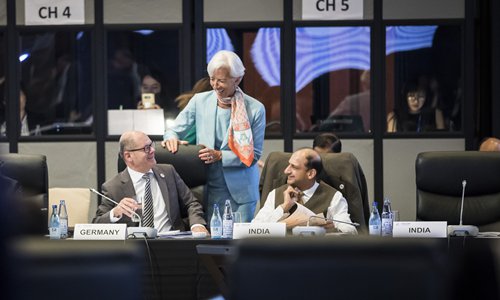HOME >> CHINA,SPECIAL-COVERAGE
Global unity needed at G20 meet
By Yang Sheng Source:Global Times Published: 2019/6/23 23:58:41
US lacks sincerity in reaching a fair trade deal: expert

German Finance Minister Olaf Scholz (left) talks to Christine Lagarde (center), Managing Director of the International Monetary Fund, during the annual G20 Finance and Central Bank Deputies Meeting in Fukuoka, Japan on June 9. Photo: VCG
Ahead of President Xi Jinping's trip to attend the G20 summit, which takes place from Thursday to Saturday, the US is not showing enough good faith to demonstrate that it wishes to ease the trade tensions, Chinese observers said.
G20 members should unite to oppose protectionism and unilateralism at the summit, and be realistic about the prospects that the two largest global economies will reach a deal in the near future, they said.
Xi will attend the 14th G20 Summit in Osaka, Japan from June 27 to 29, at the invitation of Japanese Prime Minister Shinzo Abe, Foreign Ministry spokesperson Lu Kang said in Beijing on Sunday.
At the request of the US, Xi had a phone conversation with US President Donald Trump on June 18, and the two sides agreed to meet during the G20, the Xinhua News Agency reported.
Li Haidong, a professor at the China Foreign Affairs University's Institute of International Relations, told the Global Times on Sunday that "a meeting between the two leaders could ease the tension to some extent, but the international community should not be too optimistic, since the complicated disputes between the two sides can't be solved by only one meeting."
The US put five more Chinese tech entities on a trade blacklist on Friday, Bloomberg reported on Friday.
Observers said the move shows the US is not showing enough good faith ahead of the G20, and it may even add to the difficulty of easing the tension.
Li noted it proves that being tough on China is a consensus shared by most policymakers in the US.
Since China has repeatedly said the US needs to show it is sincere in reaching a deal based on mutual respect and fairness, the talks between the two countries will not be easy, Li said.
"Removing the tariffs on Chinese goods is almost impossible for Trump even though he is set to meet Xi at the G20," said An Gang, a senior research fellow at the Pangoal Institution, a Beijing-based think tank.
"Before reaching a deal, the US needs to keep the tariffs to pressure China… a final deal will need more rounds of trade talks," he said.
Trump said during the phone conversation that he believes the entire world hopes to see the US and China reach an agreement, while Xi responded he "stands ready to meet Trump in Osaka to exchange views on fundamental issues concerning the development of China-US relations," the Xinhua News Agency reported.
Diao Daming, an assistant professor at the Renmin University of China, told the Global Times that Trump is unlikely to talk about long-term arrangements for the China-US relationship since he is not a politician with long-term strategic vision, but focusing on short-term gains.
"His priority at present is the re-election," Diao said.
Due to domestic pressure, Trump is unlikely to make major compromises even if the US comes under sustained external pressure, not only from China, but from other G20 members, including the EU, Japan and India, Li said.
In the future, during the key period of the US presidential election, if Trump's main supporters feel under heavier pressure caused by the US' trade policies and express more concerns and worries to Trump, the US President might consider making compromises, Diao noted.
Joint efforts needed
At the G20 Finance Ministers and Central Bank Governors Meeting in Fukuoka, Japan earlier this month, finance chiefs from the member states agreed that trade and geopolitical tensions have intensified, but they did not express a pressing need to resolve them.
The final language of the meeting's communiqué excluded a proposed clause to "recognize the pressing need to resolve trade tensions," which was dropped from a previous draft debated on June 8, Reuters reported.
The deletion, which G20 sources told Reuters came at the insistence of the US, shows a desire by Washington to avoid encumbrances as it keeps tariffs on Chinese goods.
The statement also contains no admissions that the deepening China-US trade conflict is hurting global growth, Reuters reported.
This is proof that the US just does not care about the global economy as it continues to use hegemonic and unilateral measures to bully not only China, but also many other trading partners of the US, including its close allies, Li said.
The US now is not just threatening China, but all members of the international community that support free trade and multilateralism, so other G20 members should not just sit and wait for the two biggest economies to reach a deal, but should join to pressure the US to abandon its wrongdoings, according to Li.
Although the US is trying to push forward the Indo-Pacific strategy which needs to win support from India, New Delhi also wants to unite China and Russia at the G20 to resist pressures from the US, since it is also hit by US protectionism and unilateralism, Chinese observers told the Global Times.
The leaders of China, Russia and India should hold trilateral talks on the sidelines of the upcoming G20 summit, Indian Prime Minister Narendra Modi suggested to Russian President Vladimir Putin at the Shanghai Cooperation Organization summit earlier this month, according to Russia Today.
Posted in: DIPLOMACY,FOCUS